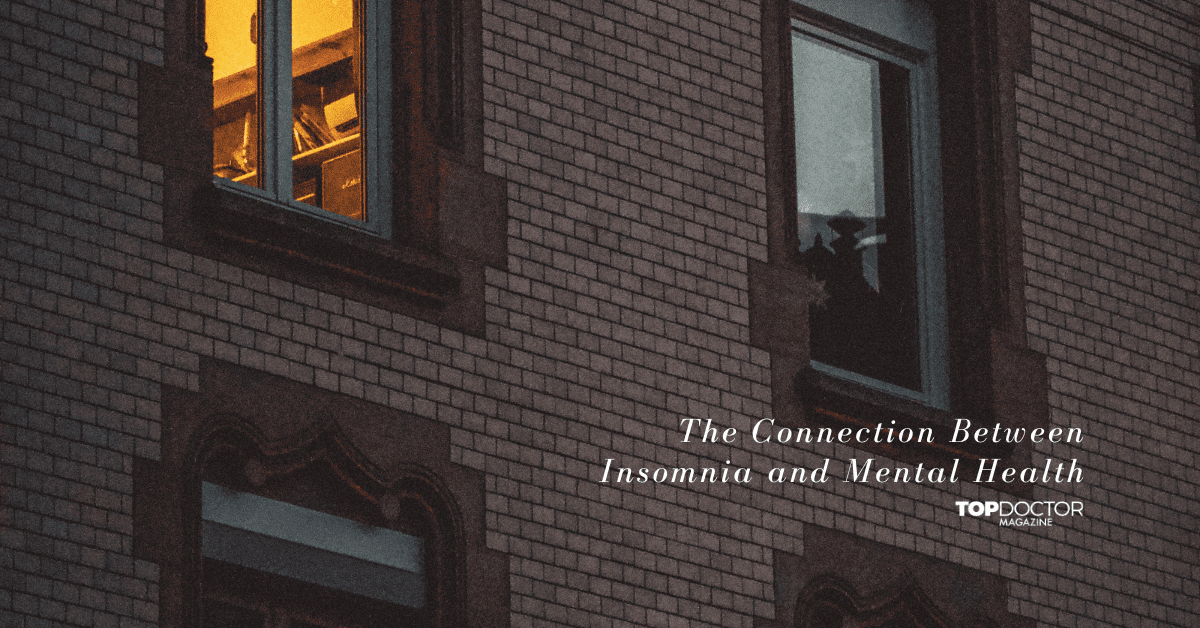Most people will agree that a good night’s sleep makes them feel more awake. You probably have heard the saying waking up on the wrong side of the bed. It refers to a person’s bad mood and has some truth to it. If a person didn’t get a good night’s sleep, this might be the reason behind their grumpiness today! Even though many factors affect both insomnia and mental health, there is good reason to believe that healthy sleep can improve mental health and treat many psychiatric illnesses.
So far, the evidence points to a two-way link between insomnia and mental health. More research is needed to learn more about this phenomenon.
Insomnia and Other Sleep Disorders
Nearly 70 million people in the U.S. suffer from sleep disorders, or they struggle to get the recommended amount of sleep each night. If you’re suffering from insomnia, that might mean you’re having trouble falling asleep, staying asleep or not getting enough sleep.
Sleep apnea is a sleep disorder that disrupts a person’s breathing while they sleep. It is sometimes the root cause of insomnia and other sleep issues.
A physician or sleep specialist can help treat your sleep apnea with various treatments. Factors like stress, travel or other life events can bring it on. Simple therapies like baths, exercise, warm milk or having a peaceful bedroom can help treat the symptoms. If insomnia episodes last for over three weeks, your doctor may recommend seeing a sleep disorder specialist.
Insomnia and Mental Health – The Connection
How often do you find yourself losing sleep when you’re worried about something? Half of all occurrences of insomnia can be traced back to some emotional or mental strain. Sleep specialists look at the signs of insomnia to see if a mental disorder is causing the person not to sleep.
Depression can cause people to wake up early, feel tired, have trouble concentrating, feel sad and alter their appetite or weight. A sudden, drastic reduction in sleep with increased activity or a lack of desire for sleep is a sign of mania.
A lot of evidence shows a direct link between Obsessive Compulsive Disorder and sleep problems. In the same way, panic attacks that happen during sleep may be a sign of a panic disorder. A sign of posttraumatic stress disorder could be the inability to sleep well because of recurring nightmares (PTSD).
Sleep problems are another common sign of a problem with drugs or alcohol. Small amounts of alcohol can help you sleep, but drinking too much can disrupt your sleep schedule. Illegal drugs like LSD and ecstasy are also known causes of sleep problems. Sedatives can make you sleepy if you take a lot of them, but their misuse or withdrawal can make it hard to sleep and cause severe sleep problems.
Insomnia worsens symptoms of various mental health conditions. Therapy may be less effective if you have severe sleep disorders. There is a clear correlation between insomnia and mental health. The best scientific data suggests that adequate sleep is essential to treating or preventing both.
Sleep and Memory Function
During the night’s sleep, the brain’s activity goes up and down at certain times. During NREM (non-rapid eye movement) sleep, brain activity goes down as a whole, but there are brief times when it goes up. Because the brain works rapidly during REM sleep, dreams during this sleep phase tend to be more vivid and easy to remember.
Each phase helps the brain work well by changing how certain brain parts perform. This, in turn, helps us with things like learning and remembering. Brain activity during sleep significantly affects emotional and mental health.
Getting enough sleep, especially REM sleep, helps the brain process emotional information. While we sleep, our brains process and store new information. Thus, not getting enough sleep makes it harder to remember good feelings. This directly relates to the presence and severity of mental health issues, such as depression and suicidal ideation or conduct.
So, the conventional belief that sleep disturbances indicate psychological pathology is being challenged. Instead, there is evidence of a bidirectional relationship between sleep and mental health, with sleep problems being both a cause and a result of mental health problems.
Obstructive sleep apnea (OSA) is also connected to mental health disorders. People with OSA experience repeated pauses in breathing throughout the night.
Evidence suggests a complex association between insomnia and mental health that can be affected by numerous factors.
Treatment
Treatment of Insomnia and mental health comes second to establishing healthy sleep routines. Try the following treatments to help get better sleep:
- Good Sleeping Habits. As the first defense against insomnia, try to adopt these measures. Start by sticking to a regular sleep schedule, eliminate stimulating activities in the hours leading up to bedtime, and create a relaxing bedroom atmosphere.
- Unwinding Techniques. Practice mindfulness, gradual muscle relaxation and deep breathing to relax before bed.
- Medication. Although you might have access to a wide variety of psychiatric drugs, it’s essential to exercise caution while combining some of them because of the potential for “over-sedation.” Some drugs have been licensed for long-term use, but doctors typically advise against using them for longer than a few weeks.
- Herbal Remedies. You can find herbal medicines like valerian root and melatonin at most pharmacies and department stores. Remember, neither medication has approval from the FDA, and there is little evidence that they are effective for most patients.
- Sleep Limitation. The term “sleep efficiency” refers to how much time a person spends asleep instead of awake in bed, and this therapy aims to improve that. It entails a progressive rise in the amount of time one can spend in bed each night.
- Cognitive Behavioral Therapy. Manage and eliminate anxious and negative thoughts with the help of this treatment.
- Light Therapy. Light therapy or Phototherapy is a treatment option for people with delayed sleep phase syndrome.
- Exercise. The quality of your sleep may increase if you start working out. Consult your doctor about the best form of physical activity for you.
Sleep and Overall Health
Getting enough sleep every night is linked to better overall health and quality of life. Current research on sleep shows that sleep may be linked to emotional regulation and memory consolidation and that not getting enough sleep may hurt these things. Getting more sleep can improve performance and memory and even help control appetite and weight.
- Sleeping less than seven hours a night increases the risk of obesity.
- Lack of sleep (less than seven hours) and oversleeping (more than nine hours) raise the risk of diabetes.
- Sleeping less than six hours every night increases the risk of hypertension by 20% to 32%.
- Avoiding tired driving, driving after less than 5 hours of sleep, and driving between 2 and 5 a.m. can minimize automobile accidents by 19%.
- Both chronic sleep deprivation and lengthy sleep durations increase mortality risk, although longer sleep durations increase mortality risk.
Happy Sleeping!
At TopDoctor Magazine, our mission is to foster connections within the health and wellness community, acting as a vital bridge between doctors and patients and facilitating collaborations between medical companies and healthcare professionals.
Our purpose extends to empowering our readers, providing them with the knowledge to make well-informed healthcare and lifestyle decisions.
We take pride in being the ultimate resource for interviews with health and wellness leaders, delivering trending medical news, and covering a wide range of healthy living topics.






0 Comments